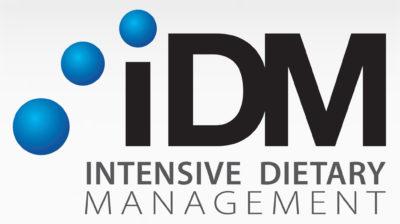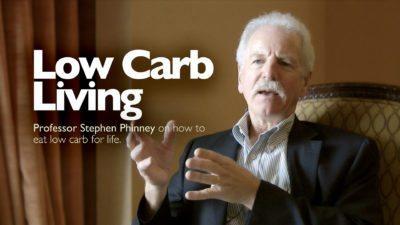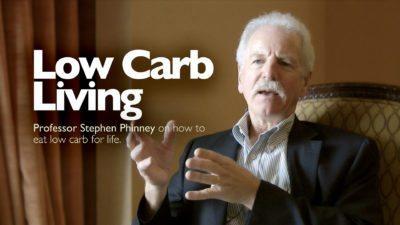More and more physicians are starting to recognize the crucial importance of diet in the treatment of chronic metabolic diseases. Recently, I asked Stanford University's Dr. Manny Lam about his experience using intensive dietary management for the treatment of metabolic disease. Reading his story reminds me powerfully of my own journey toward realization that diet is the cornerstone of good health.
Dr. Lam studied computer science at Brown University before receiving his medical degree and masters in medical sciences from Brown's Alpert Medical School. He trained at Stanford for internal medicine then worked as a hospitalist phsyician as well as teaching at Stanford. Patients present with conditions, such as heart attacks, strokes, kidney problems, liver problems, blood clots, lung infections, cancer, and bleeding, and he noticed that almost every one of my patients had high blood pressure, high triglycerides, high blood sugars, and obesity. He thought, "Man, I wish I saw you years ago..."
This was metabolic syndrome due to insulin resistance and carbohydrate intolerance. The solution was LCHF and intermittent fasting, but there was a lack of doctors in my area who was practicing this. That's why he started the Metabolic Health Clinic in sunny California.
Dr. Manny Lam
Looking at the meteoric rise of our obesity epidemic. I wonder, what would the world be like without obesity? I always thought that obesity and diabetes were inevitable, a given. We are doing all we can, and we are telling our patients all the right things, right?? I first heard about the low-carbohydrate high-fat (LCHF) or "ketogenic" diet in 2011. I reunited with one of my good friends in college. I still remember it, because he weighed 250 lbs (113 kg) in college, and had slimmed down to 150 lbs (68 kg). He lost 100 lbs (45 kg)! I asked him, "Eric, what did you do?" He said: "I cut out sugar and starches. I eat a lot of fat, and the fat melts away." When I first heard him, I felt repulsed. "What? You are crazy. Butter, are you kidding? Bacon, are you kidding? Watch out for your coronaries, because that fat is going to clog up your arteries."
At that time, I was a resident in internal medicine. My mentors taught me that saturated fat was bad; obesity is as simple as calories in and calories out. It was as obvious to me as the sky was blue and the sun shines. We learned about medicines, not nutrition, so I believed that medicines were much stronger than lifestyle changes. Why would we challenge some of the oldest givens in medicine, or even our mentors? Little did I know, nutrition was more dogma and culture than fact or science. Little did I know, nutrition was foundational to all medicine.
I did not revisit this issue until early 2016. One of my friends was practicing "intermittent fasting". He was eating within a small window and fasting the rest of the time. Of course, my gut response when hearing anything foreign to my own medical training: "What kind of fad diet is this? How is this different from calorie restriction? You are going to mess up your metabolism!" But, I respected Mike, so I decided to practice it too. Within one week, I noticed my body starting to change. I had more energy. I was more focused. I stopped having cravings, and I was not hungry. It was a sensation of calm that I never felt before.
I looked into it more, and I came across Dr. Jason Fung's website. I read his book "Obesity Code". I bought Berg's Biochemistry, and I read the chapters on fast vs. fed states, carbohydrate and fat metabolism, and ketosis. I read Gary Taubes, "Good Calories Bad Calories". This challenged my intellectual foundation about nutrition, and it came crashing down. Dietary fat is not the cause of obesity, heart disease or chronic disease. It was all the sugars and starches in our diet which leads to elevated insulin, hyperinsulinemia and insulin resistance. Obesity is a hormonal disorder. Our own government and medical societies have been telling our universe the opposite of what we should be doing. As a physician, I went through the 5 stages of grief. Is there an alternate universe out there where the obesity epidemic did not exist, and all this could have been prevented?
I became fully convinced when I saw it first hand in patients. A member of the WeFast Facebook support group had been struggling with obesity and type 2 diabetes, on 100 units of insulin. Together, we kept her accountable with intermittent fasting and low-carb high-fat nutrition. She lost 30 lbs (14 kg) in one month, and most impressively, she completely stopped her insulin because her blood sugars had normalized. All her blood work improved, and she came off her medications. Together, we did what no medicine in the world could do - reverse her type 2 diabetes. I felt proud to be a doctor, and I found myself enjoying it so much, I had to open my own clinic that specialized in fasting and LCHF.
I travelled to Toronto to meet and learn from Dr. Jason Fung and Megan Ramos at Intensive Dietary Management. I was hooked. A few months later I pulled the trigger and took the plunge. I started the Metabolic Health Clinic, a clinic that supports patients on a LCHF nutrition and intermittent fasting. I most importantly, I wanted to share with my patients that there is an alternative to more medicines, more insulin, more weight gain and more complications. There is natural cure for their obesity, their diabetes, their chronic disease. Food is our medicine.
What is your program?
I started "The Metabolic Health Clinic" in Menlo Park, CA. My clinic focuses on screening and treating insulin resistance and optimizing metabolic health. This includes obesity, high blood sugars, polycystic ovarian syndrome, high triglycerides, high blood pressure, and all downstream effects. My approach combines conventional medicine, nutritional sciences and laboratory diagnostics to find the root cause of disease. I use strategies, such as intermittent fasting and ketogenic nutrition, to lower insulin and lose body fat.
Living in the Silicon Valley, many of my patients like to see data. Additional services include body composition analysis, ketone checking and continuous glucose monitoring. Body scans monitor fat loss and muscle gains. Monitoring blood sugars for biofeedback helps patients understand the impact of food, exercise and sleep on blood sugars.
I wanted to see my patients 25 years before they came into see me in the hospital, to stop or reverse chronic disease. I incorporate the philosophy that "food is the best medicine", and I enjoy talking about nutrition and lifestyle before going to medications. I thank Dr. Fung for helping to open my eyes about the root cause of obesity through the Obesity Code.
Silicon Valley and beyond
Thanks so much, Manny. I know you will help thousands of people with your skill as a physician. It's interesting to note that the ketogenic diet and intermittent fasting has really caught fire in Silicon Valley. Literally, the very smartest people in the entire world have become interested in their health and realized, as Dr. Lam did, that nutrition is mostly dogma and not science. Now, those living in Silicon Valley will be able to get the medical supervision as well as the proper nutritional knowledge. Great job, Manny.
 For those people not in the Silicon Valley area, there are other options. I want to introduce our new Intensive Dietary Management website - www.IDMprogram.com. We've made a number of changes from the old site and I don't want readers to get confused. We've made things much more organized to find all the free resources available online. The weekly blog is still easily found along the top right of the website.
For those people not in the Silicon Valley area, there are other options. I want to introduce our new Intensive Dietary Management website - www.IDMprogram.com. We've made a number of changes from the old site and I don't want readers to get confused. We've made things much more organized to find all the free resources available online. The weekly blog is still easily found along the top right of the website.
Resources
Let's face it- losing weight is no easy feat. It's difficult even with all the support in the world. Without this support, it is virtually impossible. There's a lot of great information out there and we've listed some of our favourite websites under the 'Resources' tab.
One of the best resources on the internet is Diet Doctor, which has recipes, meal plans, news, and educational videos relating to low-carb diets and weight loss. Most of it is free, but even a subscription is only a measly $9/ month, and there's a 1 month free trial. There's the free Low Carb program at www.diabetes.co.uk delivered via email which has been used successfully by over 250,000 people. There are great cookbooks, and podcasts for low-carb and ketogenic diets.
IDM Program
Yet, the fact still remains that many people would like a real person to work with them. As a physician, I understand that. Dr. Google is great for many things, but when you get really worried or sick, most people will go to a real doctor - somebody who has the knowledge, but also the experience to guide you. It's like trying to rewire the electrical in your house based on a few videos from YouTube. You can do it, but it's kind of risky.
The same applies to dieting. Losing weight is hard, and having somebody there to guide you can be a vital asset. There are many programs to do this if you want to follow the standard calorie restriction advice of 'Eat Less, Move More'. You can join Weight Watchers, or Jenny Craig or any number of other commercial weight-loss programs. You can also visit a dietician, who often work in hospitals and community centers alongside the physician. But where can you go for a low-carb diet? Even harder - where can you go for intermittent fasting?
I'm excited to be able to offer the Intensive Dietary Management (IDM) Program to clients anywhere in the world. We provide the education, support and guidance necessary to succeed at low-carb diets and intermittent fasting. The website provides links to much of the free educational materials I've written over the last few years. There are links to the weekly blog, as well as the archives going back several years. In the Resources tab, there are links to some of the more popular lectures/ videos/ podcasts I've done. There is also the new Obesity Code podcast, which will also give listeners insights into obesity and how to treat it. We feature real life IDM client stories and the lessons to be learned including expert commentary from Gary Taubes, Nina Teicholz, Prof Tim Noakes, Dr. Peter Brukner, Dr. David Ludwig, Dr. Gary Fettke, Zoe Harcombe, Dr. Aseem Malhotra as well as Megan and myself.
We hope that everybody is able to use the free resources to take control of their own health. But I recognize that there will be those who need more personalized attention. For them, we offer the online IDM program of personalized coaching and support, providing a nutritional counsellor to help you with your own specific questions and problems. We have detailed online training videos to help you transition to low-carbohydrate, healthy-fat diet and offer suggestions as to what type of fasting regimen you may benefit from. Fees and other details can be found at www.IDMprogram.com.
In addition to the personalized attention, all our sessions are delivered in a small group format. While many people may initially feel that one-on-one sessions are better, I don't believe that true. The peer support and opportunity to learn from and teach other people in your exact same situation is very powerful. In school, we recognize that while the teacher is an important influence, peers are even more important. This is why peer pressure is considered so strong. In a supportive group setting, we turn this peer 'pressure' into peer support - a powerful source of encouragement and strength.
In fact, when I first started incorporating nutrition into my medical practice, I started with one-on-one sessions, since this is the medical model I was used to. I quickly found that failure rates were high. People felt isolated. People felt alone in their struggle. Once I switched to a group setting, there was a noticeably higher success rate. In my office, people always think they will hate the group sessions. Once they start, they love them. Other support groups like Weight Watchers and Alcoholics Anonymous have always recognized this important truth and used it for clients' benefits.
Whether or not you are interested in joining the IDM program, we welcome all to visit and take advantage of all the free resources available, including our brand-new podcast.



